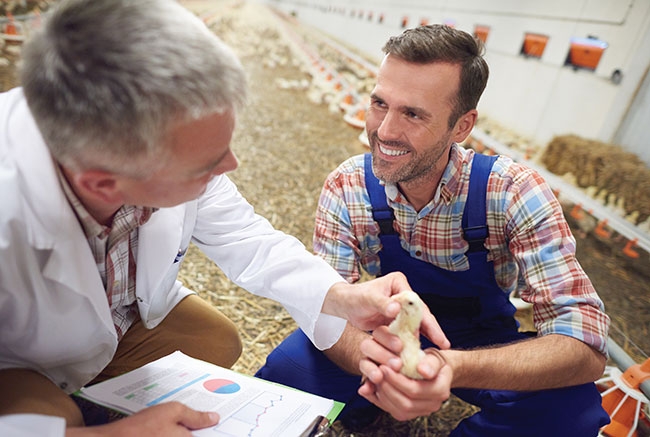
Ask a Vet: Do I have a valid VCPR?
By Tom Inglis
Features Ask the Vet HealthI heard I now need a prescription to treat my flocks as well as a valid veterinary-client-patient-relationship. What is this and how do I get started?
 Veterinary-client-patient-relationships should improve health and productivity on the farm. Photo: Adobe Stock
Veterinary-client-patient-relationships should improve health and productivity on the farm. Photo: Adobe StockA valid veterinarian-client-patient-relationship (VCPR) is simply the term given to describe the relationship the poultry farmer and the attending veterinarian share.
They work together in common trust to raise birds by incorporating best management practices and state-of-the-art veterinary service.
In doing so, they minimize bird health problems, meet accepted welfare standards and provide safe, wholesome food to the consumer. It is similar to the relationship we have with our family physician.
It is important to appreciate that a VCPR is a relationship, not a contract, a legal document or an isolated piece of paper. However, there is a mutual need on the part of the poultry farmer and veterinarian to be able to confirm that a VCPR exists if called upon do so.
Important for producers
On December 1, 2018, Health Canada introduced regulatory changes and policies to reduce the development and spread of antimicrobial resistance (AMR) that changed how antimicrobials (antibiotics) are used to prevent/treat infectious disease in food animals, including poultry.
These changes included:
- Certain medications that were commonly used in poultry production for administration by feed and water will be designated Prescription (Pr). This means a poultry farmer will now need a veterinary prescription before the products can be purchased and used on the farm.
- If feed is to contain one or more prescription products but is used according to approvals on the label, feed cannot be manufactured or leave the mill until the prescription for that feed has been received.
- Although feed mills can purchase prescription products for the manufacture of medicated feed, they can no longer sell medically important feed additives (category I, II and III antimicrobials) to farms or water administered products (medically important antimicrobials: category I, II and III). Medicated feed additives and water-soluble medications will also not be able to be sourced from farm outlet stores. These medications will be controlled like they are in human medicine. They will be dispensed only by pharmacists and veterinary clinics (every veterinary clinic is a pharmacy).
- By provincial regulations, a veterinarian cannot write a prescription for a flock of birds without understanding the operation that raises the birds – a VCPR must be in place.
As of December 1, 2018, for a producer to have feed medicated with virginiamycin, bacitracin, tylosin, or medicate a bird with potassium penicillin via the water, a veterinary prescription will be required. A veterinarian cannot prescribe a medication without knowledge of the poultry farm and its operational practices – a VCPR is required.
Important for attending veterinarians
When birds are submitted to a veterinarian for postmortem without knowledge of the operation, they can render a diagnosis and suggest a possible treatment, but the important dialogue with the poultry farmer concerning why the birds became sick may be missing.
A valid VCPR is an asset to the farm, as it requires the veterinary practitioner to understand the operation at a level where they can help prevent future outbreaks of disease. When done properly, a valid VCPR improves overall health of the operation and does not cost – it pays!
Most poultry farmers have participated in a valid VCPR for many years even without having directly paid a veterinarian. It is common in the poultry industry for veterinarians to be hired by suppliers to the poultry operation. However, there are other poultry farmers that have not partnered with a veterinarian in a valid VCPR. If you are unsure if you have a current VCPR, ask:
- Is there a veterinarian who I know well and understands my farm?
- If I had a health problem on my farm which veterinarian would I contact?
If you answer no or I’m not sure, you likely don’t have a veterinarian who would consider themselves as “your vet” and you likely don’t have a valid VCPR.
If these poultry farmers continued without a VCPR they would be putting the health and welfare of birds under their care at risk.
On a very practical note, it’s far from ideal for a veterinarian to learn about the operation and get to know a producer and their priorities during a disease outbreak – in fact, it’s a worst-case scenario that may result in delays and potentially costly mistakes.
While the regulations have changed to require a VCPR and prescription to treat food animals, in most cases this requirement should improve health and productivity of the farm.
How do I develop a VCPR?
The poultry farmer and veterinarian must each engage in outreach to find each other. Once they’ve made contact, and realizing that a VCPR describes a relationship, not a document, they can develop a description of the poultry enterprise for a good starting point. For ideas on what to include in that description, see the online version of this story at canadianpoultrymag.com. In summary, a VCPR is necessary and will surely contribute to a stronger poultry industry!
Print this page